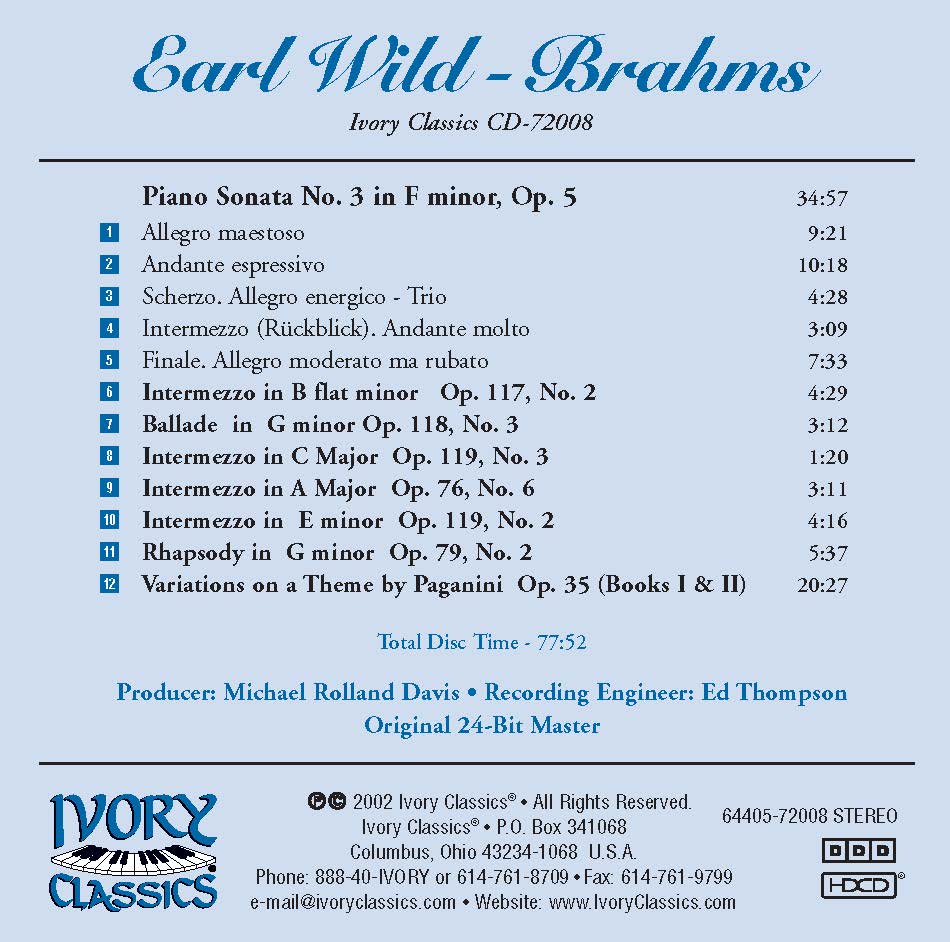Ivory Classics Music
Earl Wild: Johanns Brahms
Earl Wild: Johanns Brahms
Couldn't load pickup availability
Ivory Classics CD-72008
Earl Wild: Johanns Brahms
Johannes Brahms (1833-1897)
Piano: Earl Wild
Producer: Michael Rolland Davis
Engineer: Ed Thompson
Piano Technicians: Gary Shipe (1-5), Edd Kolakowski (6-11)
Total Time: 77:52
Piano: Steinway, Baldwin
Recorded at Holy Trinity Lutheran Church, Buffalo, NY. May 5-6, 2002 (1-5).
Recorded in Columbus, Ohio September 21, 2000 (6-11).
Recorded in Concert in Salle Gaveau, Paris March 22, 1982 (12)
Original 24-Bit Master Recorded direct to the Sadie Artemis 24-Bit High-Resolution disk editor.
There is no substitute for the wisdom of age and experience. Earl Wild, the legendary 86-year-old Grammy Award-winning virtuoso pianist, in a new recording of Brahms. "Of the great many recordings of Brahms' monumental Sonata No. 3 that I have heard, Earl Wild's is far and away the most fully realized, the most musically satisfying, and the most breathtaking. His performance is simultaneously spacious and taut, orchestrally textured and utterly transparent, sweeping in feel and elegantly detailed. Wild's command of the Sonata is so complete and his playing (even at 86) so brilliantly captures its expansive tonal palette, volatile drama, and its exquisite poetry, we are apt to forget that Brahms' writing teems with technical difficulties. Wild's Paganini Variations have irresistible flair - they are as brilliant musically as they are technically. The recording as a whole is unsurpassable."
Disc.Reviews
Earl Wild's new recording of the Brahms F minor Sonata Op.5, No.3 is by far the best version currently available on disc. It belongs in everyone's library.
'Building a CD Library', BBC Radio 3, Mar. 2003
It's funny how Brahms' youthful, big-boned F minor sonata often proves to be a youth tonic for veteran pianists, who gleefully brave the work's considerable challenges and survive miraculously unscathed. Harold Bauer's recording is a good example, as is Etelka Freund's; and then there's the 72-year-old Arthur Rubinstein's classic stereo version. At 86, Earl Wild may be the oldest pianist to have recorded this gnarly opus, but damned if he doesn't sound like an unbridled young virtuoso. He digs into the opening movement's massive chords and dauntingly unidiomatic octave passages with a kind of galvanizing assurance that makes his 50-something counterparts on disc--such as Daniel Barenboim and Vladimir Ashkenazy--sound arthritic by comparison.
In his program notes, Wild cautions those who tend to drag the sublime Andante, favoring a two-beats-to-the-bar conception as opposed to, say, Claudio Arrau's expansive four-beat approach. Yet Wild himself takes plenty of time to savor lyrical niceties. He eases into the Scherzo's opening flourish and quickly slams on the accelerator: there's no place for repose in such a demonic reading. If the Finale is not as incisive and dynamically varied as it might have been, notice the care with which Wild organizes the bass lines or his intelligent melodic parsing of the rolled left-hand chords in the coda.
The short pieces prove no less absorbing or (for the most part) convincing. To my ears, however, Wild's Chopin-esque rubatos in the B-flat minor Intermezzo slightly detract from the music's classical restraint. By contrast, his rapid, forceful dispatch of the C major "Myra Hess" Intermezzo (Op. 119 No. 3) lacks grace and lilt. A live 1982 performance of Brahms' Paganini Variations finds Wild on more inspired and communicative form than his admirable though relatively straightlaced 1967 Vanguard studio recording, and his 66-year-old fingers prove more than up to the task. Invariably, the sonics change from venue to venue (a church in Buffalo, the Salle Gaveau in Paris, and of course, Wild's Columbus, Ohio home studio), but not distractingly so. How many other pianists remain at the top of their game in their late 80s and continue to evolve as artists and musicians while remaining true to themselves? A remarkable disc.
Classics Today, Mar. 2003
At an age when most pianists put up their feet and contemplate the music scene from a comfortable distance, 86-year-old Earl Wild defies nature and convention, recording and taking in his stride such formidable masterpieces as Beethoven's Hammerklavier Sonata, the Chopin Etudes and, now, Brahms's F minor Sonata.
The possessor of one of the sleekest and feline, suave, and scintillating techniques of all time (it aroused the awe of Horowitz), Wild continues to play with an energy and commitment that are truly astonishing. Even when you note, figuratively speaking, a thickening of the waist, a lack of pin-point definition, or the burning clarity that once marked his performances, such limitations are easily swept aside by a thrilling sense of grandeur and occasion. There is no lack of thunder in the octave declamation commencing at 4'29" in the Sonata's opening Allegro maestoso, no absence of propulsion in the fist-shaking Scherzo, and only a certain stiffness mars the confidentiality of the Andante expressivo where, as Sterner has it, "now gleams in the gloaming the pale moonlight, And there two loving hearts unite, In ecstasy bound together."
Wild's return to the Paganini Variations (his 1967 Vanguard disc is still available) is taken live from a 1982 Paris recital and includes a pungently clipped way with the opening theme, a brilliantly fleet disposal of the contrary motion octaves of Variation 7 and a sardonic sense of the humour beneath Brahms' outlandish demands in the octave glissandi of Var. 13. The welling phrases of Var. 2 from Book 2 are boldly characterized and there is a dancing lightness to Var. 14. Given such attributes, only a pedant will quibble over a mischievous Michelangeli-like reversal of the codas, particularly when the performance ends with such a triumphal sense of homecoming.
In more contemplative Brahms Wild is more variable, though he breaks out into the light magnificently in the Op. 118 Ballade. Even when unsettled by the composer's late interior musings (for William Ritter "like the golden luster of parks in autumn, and the austere black and white of winter walks") his affection and command are unmistakable. There may be finer performances of all these works in the catalog but Wild's achievement makes such comparisons irrelevant. The recordings are successful and Elliot Ravetz's 30-page booklet essay provides a superb bonus.
'A splendid Brahms recital which proves Earl Wild is still a lion among pianists' Gramophone, Jan. 2003
Not many people would associate Brahms with Earl Wild immediately in spite of the fact that this is not his first recording of this music. In fact, Earl Wild made some (sadly unavailable)recordings of Brahms in the '60s. But then again, his reputation as a super-virtuoso has always been based on his seemingly effortless playing of the most complicated transcriptions in the repertoire (his live recital on the Philips great pianists is extraordinary) and also his recordings of Liszt and Rachmaninov. But, Brahms would hardly come to mind in association with Earl Wild. So it comes as a true revelation to hear him in this new recording well in his 80s, in full command of his legendary technique and also showing how works such as the 3rd sonata can be played and still sound fresh. And indeed, this is the performance of someone who is in no hurry, and yet manages to make everything absolutely coherent in this work which can be difficult for the performer and the listener as well. And in regards to a singing line, I surely hope younger pianists get a hold of this true lesson in legato and tone. After some short works including intermezzos from various opus as well as rhapsodies, the other big piece on this recital is a live performance (1982) of the Paganini variations. Here Earl Wild tinkers a bit with the ordering of the variations and in doing so produces a version that is much more of a concert piece than is usually heard. And the virtuosity is vintage Wild in its speed, accuracy, range of colors, and power. Aged 87 now, I cannot help but wonder if the final word on this brilliant pianist has been said already. But judging by a recital as this, I doubt anyone will be able to dismiss Earl Wild as merely a virtuoso magician - true recognition for this master musician who obviously still has much to tell us is long overdue.
Amazon.com, Nov. 2002
Share
































































